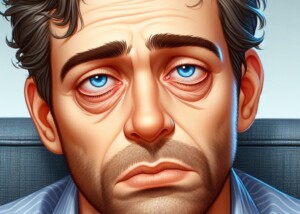
The twist on this is the accompanying burning throat that comes with waking up in the middle of the night struggling to breathe.
Usually when someone awakens gasping for breath, that’s their only symptom.
A common cause for the solitary symptom of waking in the middle of the night, or shortly after falling asleep, is an episode of apnea (ceased breathing).
Sleep apnea usually results from an obstruction in the upper airway as the structures become relaxed with slumber. Thin women, not just overweight men, can have obstructive sleep apnea.
If the person has not breathed for a while, the decreasing levels of blood oxygen alert the brain, often arousing enough consciousness to startle the person awake – and they find themselves feeling as though they’ve been holding their breath for a minute.
The feeling has been described as choking, gasping and suffocating. There may not be any burning in the throat. The problem is usually resolved after one deep breath.
But what’s going on when, along with this choking sensation in the middle of the night, there’s burning in the throat?
“Acid reflux from the stomach all the way up into the throat is called laryngopharyngeal reflux, or LPR,” says Gene Liu, MD, MMM, and Chief, Division of Otolaryngology, Cedars-Sinai Medical Group.
“When this happens in the middle of the night, most people usually do not feel anything when they are asleep, but wake up with a sour taste in the mouth, thick phlegm in their throat and perhaps some mild hoarseness,” continues Dr. Liu.
“On occasion, however, LPR at night causes the sphincter at the top of the esophagus to spasm in an attempt to prevent the stomach juices from coming up too high into the throat.
“If it gets high enough, the vocal cords themselves can also spasm in order to prevent the juices from going into the windpipe and causing irritation or inflammation in the lungs.
“When you have a sudden spasm in the throat in the middle of the night, it can definitely wake you up suddenly with gasping and choking and a burning sensation in the throat.”
Even worse is if a person has both obstructive sleep apnea and LPR.
Treatment for sleep apnea (most notably, a CPAP machine) will not be effective in preventing LPR’s burning in the throat.
Treatment for LPR, likewise, will not reduce episodes of disordered breathing.
What may improve both conditions, however, is sleeping with an elevated torso (not just head, but trunk).
This will help keep acidic stomach juices from getting into the throat, and may reduce apnea incidents.
A diagnosis of sleep apnea is made with a sleep study which can be done at home.
A diagnosis of LPR can be made by an otolaryngologist.
 Dr. Liu’s clinical areas of focus cover a broad range including surgery of the head and neck, sinuses and thyroid, and disorders of the ears, salivary glands and vocal cords.
Dr. Liu’s clinical areas of focus cover a broad range including surgery of the head and neck, sinuses and thyroid, and disorders of the ears, salivary glands and vocal cords.
 Lorra Garrick has been covering medical, fitness and cybersecurity topics for many years, having written thousands of articles for print magazines and websites, including as a ghostwriter. She’s also a former ACE-certified personal trainer.
Lorra Garrick has been covering medical, fitness and cybersecurity topics for many years, having written thousands of articles for print magazines and websites, including as a ghostwriter. She’s also a former ACE-certified personal trainer.
.









































